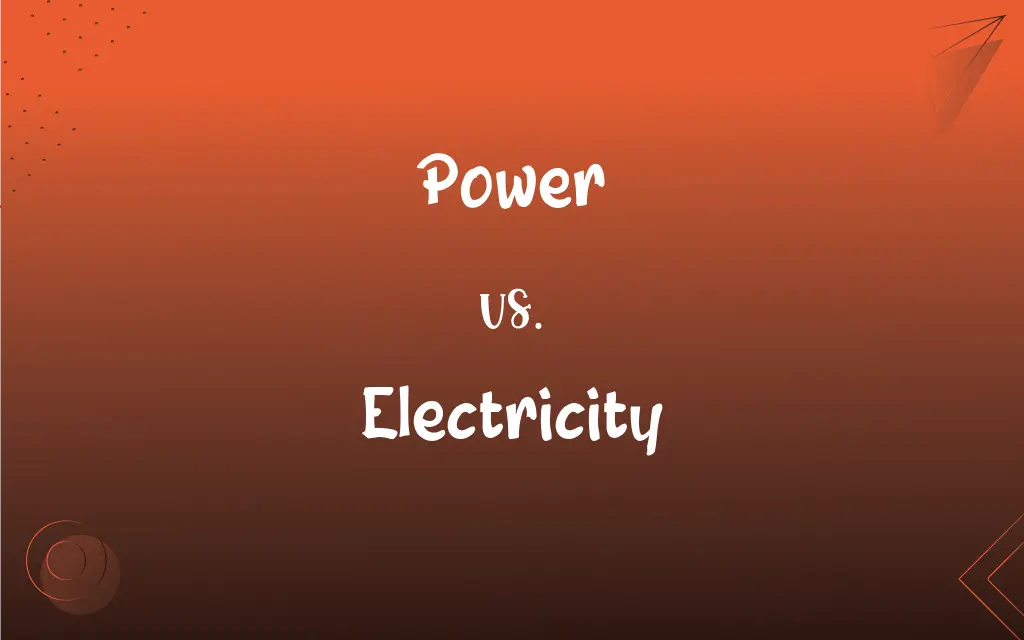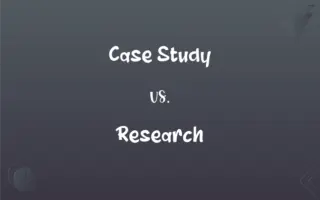Power vs. Electricity: What's the Difference?
Edited by Aimie Carlson || By Janet White || Published on December 1, 2023
Power refers to the rate of doing work or transferring energy, while electricity is a form of energy resulting from charged particles like electrons.

Key Differences
Power, in a general sense, refers to the rate at which energy is transferred or converted. In contrast, electricity specifically denotes the presence and flow of electric charge, typically via electrons, used for energy.
Power is measured in watts, indicating how quickly energy is used or transferred. Electricity, however, is not measured in watts but can be measured in terms of voltage (volts), current (amperes), and resistance (ohms).
Power is a broader term in physics, encompassing various forms of energy like mechanical, electrical, and thermal. Electricity is a specific type of energy, associated with electrical devices and power generation.
In practical applications, power describes how fast an appliance can convert electricity (or other forms of energy) into useful work, like a light bulb converting electrical energy into light. Electricity is what flows through power lines and cables, powering those appliances.
Power can be generated from various sources, including electricity, but also from mechanical, thermal, or chemical sources. Electricity itself is a form of energy that can be generated from various means, such as hydro, solar, or nuclear power.
ADVERTISEMENT
Comparison Chart
Definition
Rate of energy transfer
Flow of electric charge
Measurement
Watts
Volts, Amperes, Ohms
Application
Energy usage in devices
Energy flow in circuits
Types
Includes electrical, mechanical, etc.
Specifically electrical
Source and Generation
Various, including electricity
Generated from various energy sources
ADVERTISEMENT
Power and Electricity Definitions
Power
Power refers to the capacity to influence or control.
The power of the president is significant in policy-making.
Electricity
Electricity is a form of energy caused by moving electric charges.
Electricity powers most of our home appliances.
Power
Power is the rate at which energy is transferred or used.
The power output of the engine was 100 horsepower.
Electricity
Electricity is a physical phenomenon involving charge.
Static electricity causes your hair to stand up.
Power
Power can mean physical strength or force.
The athlete displayed incredible power during the competition.
Electricity
Electricity encompasses the presence of electric charge.
Electricity in clouds results in lightning.
Power
Power means political authority or control.
The party gained power after winning the election.
Electricity
Electricity refers to the supply of electric power.
The city's electricity comes from renewable sources.
Power
Power, in an electrical context, is the rate of electrical energy use.
The power consumption of the appliance is 50 watts.
Electricity
Electricity can mean the flow of electric current.
The circuit conducts electricity efficiently.
Power
The ability or capacity to act or do something effectively
Is it in your power to undo this injustice?.
Electricity
The physical phenomena arising from the behavior of electrons and protons that is caused by the attraction of particles with opposite charges and the repulsion of particles with the same charge.
Power
Often powers A specific capacity, faculty, or aptitude
Her powers of concentration.
Electricity
The physical science of such phenomena.
FAQs
Can power exist without electricity?
Yes, in other forms like mechanical.
Is power always related to energy?
Yes, it's a measure of energy usage or transfer.
How does power relate to electrical devices?
Indicates how fast they convert electricity into work.
How is power measured in electricity?
In watts.
What is power in the context of physics?
Rate of energy transfer or conversion.
How do we measure electricity?
In volts, amperes, and ohms.
What are common sources of electricity?
Fossil fuels, nuclear, solar, wind.
What is electricity made of?
Flow of electrons or charged particles.
Does power vary with different energy sources?
Yes, depending on the energy source and efficiency.
What is an example of power in a non-electrical context?
The power of a moving vehicle.
Can electricity exist in static form?
Yes, as static electricity.
How does power affect energy consumption?
Higher power devices consume more energy faster.
What happens when electricity is cut off?
Devices relying on it stop functioning.
Is electricity a form of energy?
Yes, it's a specific type of energy.
Can electricity be renewable?
Yes, if generated from renewable sources like solar.
Is electrical power important in daily life?
Yes, it's essential for running electrical devices.
Is electricity dangerous?
It can be if not handled properly.
How is electricity transmitted?
Through power lines and grids.
Can power be stored?
Not directly; energy can be stored, power is the rate of use.
How does electricity power a home?
By flowing through circuits to power devices.
About Author
Written by
Janet WhiteJanet White has been an esteemed writer and blogger for Difference Wiki. Holding a Master's degree in Science and Medical Journalism from the prestigious Boston University, she has consistently demonstrated her expertise and passion for her field. When she's not immersed in her work, Janet relishes her time exercising, delving into a good book, and cherishing moments with friends and family.
Edited by
Aimie CarlsonAimie Carlson, holding a master's degree in English literature, is a fervent English language enthusiast. She lends her writing talents to Difference Wiki, a prominent website that specializes in comparisons, offering readers insightful analyses that both captivate and inform.






































































